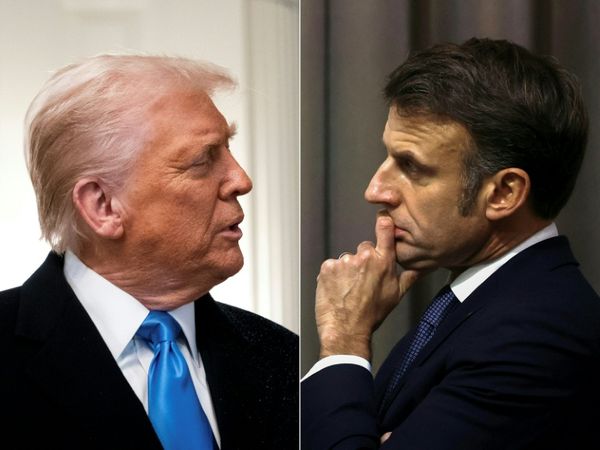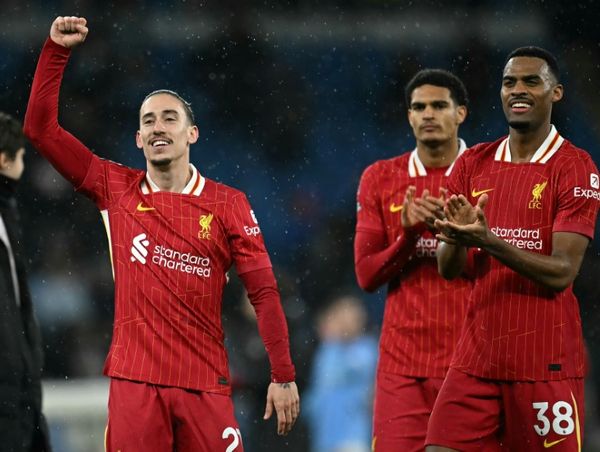It was a dramatic moment for U.S. involvement in the Ukraine war.
Nancy Pelosi, one day after her surprise meeting with Ukrainian President Volodymyr Zelenskyy in Kyiv, told the press in Poland on Sunday: “America stands with Ukraine. We stand with Ukraine until victory is won.” For good measure, she added: “Our commitment is to be there for you until the fight is done.”
I’ve put those two phrases in italics because the House speaker used words the administration avoided for weeks when addressing Vladimir Putin’s war on Ukraine — notably "victory" and "win." And even on the rare occasion when the win word was snuck in, the level of military aid didn’t match.
Coming so soon after President Joe Biden’s vital request to Congress for $33 billion in additional short- and long-term aid to Ukraine, those words now signify a deeper commitment. That terminology is welcome because it signifies that the Biden team finally recognizes Ukraine could win — if the right heavy weapons from the West arrive soon enough — and will back the country for the long haul.
Yet if Ukrainian “victory” is now the U.S. goal, Biden needs to clarify what a win would look like. He needs to better explain to Americans why such a win is vital for our country’s security — and for democracy worldwide.
On the surface, it looks as if Biden should have no problem with public opinion. A new Washington Post-ABC News poll shows a big majority of Americans back sanctions on Russia and aid to Ukraine, with 36% saying that the United States is giving the right amount of support and 37% saying that it is giving too little.
But there are burbling currents in this country, often on the far-right, that buy Putin’s message that he is merely defending Russia against Ukrainian Nazi aggression. Foreign Minister Sergey Lavrov is even promoting a bizarre claim that Hitler was partly Jewish in order to justify the Kremlin’s obscene claim that Zelenskyy, a Jew, is really a Nazi drug addict.
Yet former President Donald Trump praised Putin’s “genius” at the beginning of the invasion.
Yet J.D. Vance, Trump’s choice for Republican Senate candidate in Ohio, tweeted in February: “I don’t really care what happens to Ukraine.”
Yet cable news’ most popular talk show host, Tucker Carlson of Fox News, who has repeatedly dumped on Ukraine and Zelenskyy, claimed this week that U.S. support for Ukraine has nothing to do with helping Ukrainians. Instead, he said, that support represents Democratic efforts “to topple the Russian government” as “payback for the 2016 election.”
Carlson also pushed the Kremlin lie that the U.S. was making bioweapons in Ukraine. It’s no surprise that this Kremlin-hugger is regularly praised and replayed on state-controlled Russian media. Yet many Americans believe him, too.
Meantime, some respected theorists of geopolitics blame the war on NATO’s expansion eastward which, they argue, upset Putin. They insist that Washington should press Zelenskyy to make a compromise deal with Putin as soon as possible.
Given these counter currents and the fickleness of public opinion, one cannot take long-term U.S. public support for Ukraine for granted, especially as we approach the poisonous atmosphere of the 2022 midterms — let alone the 2024 presidential election.
Here, then, are the points that I believe Biden must make clear to Americans going forward:
— This war is about Russian aggression, full stop, and Putin’s imperial ambition to control and/or annex Ukraine, which he believes is part of historic Russia. It is not about NATO expansion. When Russia first invaded Ukraine in 2014, Ukrainian public opinion opposed joining NATO. Not now.
— If Putin gets away with seizing and keeping more Ukrainian land, this changes all the rules that have kept the Western world safe since World War II. It means any country with sufficient weapons — especially nukes — can threaten its neighbors in order to seize parts or all of their land. In Asia, China might follow suit with Taiwan or North Korea with South Korea. In such a dog-eat-dog world, the United States will ultimately get dragged in.
— Ukraine’s goal — as expressed by Zelenskyy — is for Russian troops to withdraw from all territory seized after the Feb. 24 invasion. Then negotiations can begin, including over the fate of Crimea and the eastern Donbas region that were annexed by Moscow in 2014. This could be called an incomplete Ukrainian “win.”
— There can be no serious Ukraine-Russia negotiations unless No. 3 is completed. Zelenskyy has already offered to refrain from joining NATO and for Ukraine to remain neutral, but Putin is not interested. He wants to annex eastern and southern Ukraine and destroy the rest.
— The United States’ goal is to help Ukraine achieve No. 3. It is not to achieve regime change in Moscow (this will not happen unless it is compelled by Russians themselves). Secretary of Defense Lloyd Austin’s recent statement about wanting “to see Russia weakened” specified that he meant weakened so that Moscow couldn’t invade more neighbors. Still, as a rule of thumb, it’s better to speak softly and carry a big stick.
Ukraine’s fight is our fight because Ukrainians are battling to avoid a takeover by a criminal dictator, in Europe, in the 21st century. If that doesn’t wake Americans out of their take-democracy-for-granted stupor, then shame on us.







